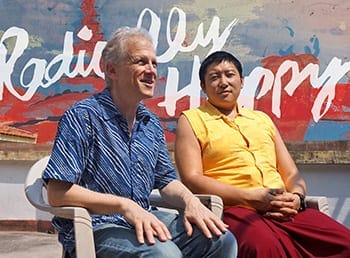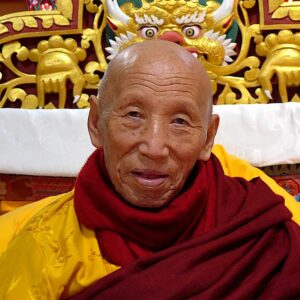My phone was buzzing. So, I picked it up and saw it was Phakchok Rinpoche leaving me WeChats. For most of the last year he and I, with a lot of input from my wife, had been kicking around a few ideas for a book we wanted to write. The idea of an accomplished Tibetan Master and a Silicon Valley businessman/geek/practitioner combining forces seemed like an interesting place to start. We recruited a first class graphic artist to make the book beautiful. And although we had a lot of the basic topics down, we had no simple unifying structure. So as I listened to the Wechat, the first thing that struck me is how excited Rinpoche sounded when he said: “The book should have three main sections: Happiness, Great Happiness and Bliss.”
There it was, three principles that tied together everything we had been kicking around. A book that has broad appeal, is immediately relevant to modern life, yet is completely informed by the three yanas. Ancient knowledge in a modern world, meditation in a stressful world, compassion in a time of a lot of self-centered concerns all suffused with the wisdom handed down to us through the kindness of our masters.
The language still needed a bit of work. Bliss is so easily misunderstood to be some sort of experiential state. Yet the authentic bliss of Vajrayana transcends any sort of subject/object dichotomy. As Kyabjé Tulku Urgyen Rinpoche once said to me, bliss is simply the absence of any kind of samsaric (i.e. conditioned) state. It was in Barcelona a few weeks later, talking with friends that things became a lot clearer: Basic Happiness, Interconnected Happiness leading to Radical Happiness.
Basic Happiness arises when we can be fully present, free from habitually chasing thoughts like a dog chases stones.
Interconnected Happiness arises when we connect in a loving embrace with the world we habit and the people we interact with. The more connection we feel with what’s around us, the less we will obsess about ourselves, and the more life satisfaction we will experience. Rinpoche keeps saying this is where we begin to find our lives have meaning.
Radical Happiness comes from first bringing the first two together. It grows stronger as we cultivate dignity through listening, reflecting and experiencing. Ultimately Radically Happiness comes from learning to how to turn our attention from rising thoughts and emotions towards the awareness that experiences them.










Responses
Very much looking forward to this book/program. As you have hinted at above, language is crucial. Bliss, happiness etc can mean so many things to so many people.
Hopefully it can veer people away from a superficial happy clappy type of happiness that many associate with meditation, spiritual practices. “blissing out” etc.
A grounding or settling in one’s basic goodness is often the key. Is this touched upon in the book?
Thanks for your kind words Phillip!
We don’t talk about basic goodness. We did consider it, but in the end took a different approach, I think it ends in the same place though. It might be an idea for a future blog though…